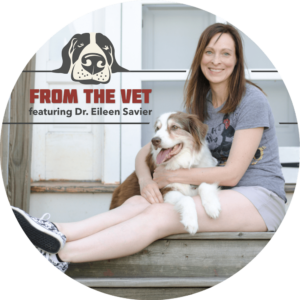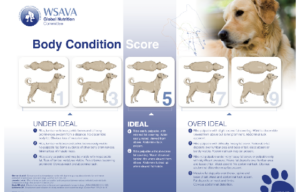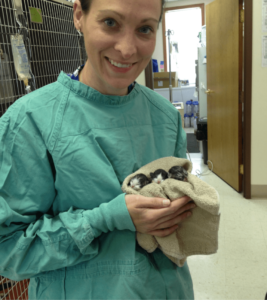[vc_row][vc_column][trx_section box=”yes”][trx_title align=”center” color=”#d9ae4c” weight=”700″]
Obesity in Dogs
[/trx_title][trx_title type=”4″ align=”center” color=”#434544″ weight=”700″ bottom=”mini”]by Dr. Eileen Savier CVA, CVCH[/trx_title][vc_column_text]

Obesity is defined as excess body fat, to such an extent that it compromises health. In general dogs are considered obese when their excess fat exceeds optimal body weight by 15-20%. It has been estimated that 25-44% of pet dogs are obese. Animals who remain overweight have a reduced life expectancy by as much as 2-3 years, while suffering from obesity related conditions. Body condition scoring is a simple and quick means of estimating obesity. Body condition scoring is widely accepted for assessing levels of body fat subjectively with a combination of visual assessment and palpation. Each animal is classified on a scale (1-5 or 1-9 depending on which scale is being used).
 Obesity is a complex issue that involves genetic and environmental factors. There are also some diseases, medication, and rarely genetic disorders (more common in humans) that may contribute to obesity. However, obesity is almost always cause by more calories being consumed than being used over time. Neutering/spaying causes a reduction of caloric requirements which predisposes pets to obesity to after surgery calories should be reduced to prevent obesity. Consequence of obesity can be devastating and can affect nearly all body systems:
Obesity is a complex issue that involves genetic and environmental factors. There are also some diseases, medication, and rarely genetic disorders (more common in humans) that may contribute to obesity. However, obesity is almost always cause by more calories being consumed than being used over time. Neutering/spaying causes a reduction of caloric requirements which predisposes pets to obesity to after surgery calories should be reduced to prevent obesity. Consequence of obesity can be devastating and can affect nearly all body systems:
-
Arthritis
-
Insulin resistance and Type II Diabetes
-
Increased cholesterol and triglycerides
-
Heart disease
-
Kidney disease
-
Respiratory disease
-
Cancer
Diet and exercise are both needed for weight loss. Discuss a weight loss program with your veterinarian to be sure you proceed safely. Concurrent disease, the amount of weight loss needed, and time of year may alter each individual pets treatment plan. For example morbidly obese pets may need to start in an underwater treadmill to allow movement while reducing excess stress on joints. Keep in mind that there are calories in every treat, dog bone/ chew, dental chew, etc. that you give your pet. If your pet struggles with obesity be sure to account for the amount of calories in treats.
[/vc_column_text][/trx_section][/vc_column][/vc_row][vc_row css=”.vc_custom_1533135180690{margin-top: 40px !important;}”][vc_column css=”.vc_custom_1533134942241{background-color: #d9ae4c !important;}”][trx_title type=”2″ align=”left” color=”#f6f2e4″ left=”20″ right=”20″]About Dr. Eileen Savier[/trx_title][vc_column_text css=”.vc_custom_1533135315368{padding-right: 20px !important;padding-bottom: 30px !important;padding-left: 20px !important;}”] Barks & Recreation is proud to feature Dr. Eileen Savier CVA, CVCH as our Veterinary Blogger in our “From the Vet” Series. Currently part of the team of doctors at Keystone Veterinary Clinic, Dr. Savier is a 2012 Graduate of the Ross University School of Veterinary Medicine, She completed her clinical experience at The Ohio State University and after veterinary school she pursued further education and certification in Veterinary Acupuncture, Chinese Herbal Medicine, and Fear Free veterinary visits. Dr. Savier has a special interest in integrative medicine, animal behavior, and internal medicine and is committed to improving animal health care by integrating Eastern and Western philosophies. She enjoys working with fearful & aggressive dogs and cats and she has had additional training in low stress handling techniques and encourages positive reinforcement during exams and procedures. Her clinical interests include pain management, animal behavior, geriatric patient care, and internal medicine. Dr. Savier is a member of the following associations:
Barks & Recreation is proud to feature Dr. Eileen Savier CVA, CVCH as our Veterinary Blogger in our “From the Vet” Series. Currently part of the team of doctors at Keystone Veterinary Clinic, Dr. Savier is a 2012 Graduate of the Ross University School of Veterinary Medicine, She completed her clinical experience at The Ohio State University and after veterinary school she pursued further education and certification in Veterinary Acupuncture, Chinese Herbal Medicine, and Fear Free veterinary visits. Dr. Savier has a special interest in integrative medicine, animal behavior, and internal medicine and is committed to improving animal health care by integrating Eastern and Western philosophies. She enjoys working with fearful & aggressive dogs and cats and she has had additional training in low stress handling techniques and encourages positive reinforcement during exams and procedures. Her clinical interests include pain management, animal behavior, geriatric patient care, and internal medicine. Dr. Savier is a member of the following associations:
- American Veterinary Medical Association (AVMA)
- International Veterinary Academy of Pain Management (IVAPM)
- American Association of Feline Practitioners (AAFP)
- American Veterinary Society of Animal Behavior (AVSAB)
- American Association of Traditional Chinese Veterinary Medicine (AATCVM)
- Ohio Veterinary Medical Association (OVMA)
Dr. Savier shares her home with two (soon to be three) dogs, two cats, and a toddler. She lovingly refers to her two dogs as Coconut Retrievers as they were rescue dogs she brought home from the island of St. Kitts. In her free time she enjoys spending time with her family, going to the beach, and planning her next Disney vacation.
Join us every month for Dr. Savier’s “From the Vet” series to get more information related to the health and welfare of your furry family members![/vc_column_text][/vc_column][/vc_row]



